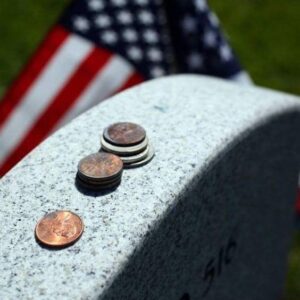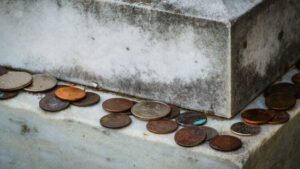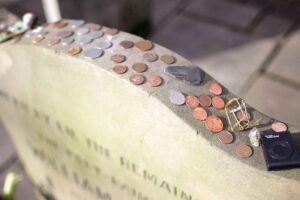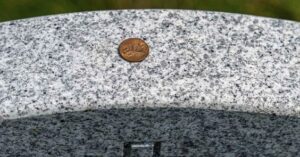We all express sadness, love, and respect in different ways when it comes to remembering and honoring departed family members. Every tradition has meaning, whether it be through private times of introspection, unique customs, or events honoring the lives of the deceased. Even if these activities may appear strange or out of the ordinary, it is crucial to accept these diverse cultures and recognize the ways people choose to memorialize their loved ones in today’s world.
Coin putting on gravestones is one such custom that frequently sparks interest. You may have wondered, “Why do people do this?” after seeing pennies strewn on gravestones in cemeteries. Like many long-standing customs, it has significant meaning and is observed throughout the United States and in some other nations.

I was a child visiting my grandfather’s final resting place when I first saw pennies on a gravestone. I was still drawn to the coins scattered on the headstones, dimes, nickels, and pennies. I couldn’t help but question why it was done. Was it a tribute to the individual? A tradition inside the family? I finally took the time to comprehend this enigmatic and significant practice as I got older and more curious.
It wasn’t long before it became clear that military culture is the source of this somewhat enigmatic custom. More recent study disproves several early theories that linked the practice to Roman Empire soldier honoring customs. Rather, it is now generally accepted that the United States, namely during and during the Vietnam War, is where the custom originated.

Soldiers and people alike looked for methods to honor dead warriors during this time of sharp political disagreement without reopening old wounds associated with the contentious conflict. Instead of getting in touch with the family personally, which could result in awkward conversations about the war, laying a coin on the grave became a little yet heartfelt gesture. It honored the soldier’s life as well as the nuanced feelings surrounding the conflict by expressing respect and unity without the need of words.
The custom of placing pennies on gravestones has developed throughout time, and it now serves purposes beyond merely showing respect during contentious political periods. This custom has been embraced by both citizens and veterans as a means of remembering the fallen. Every coin placed on a gravestone has a distinct meaning, making the process profoundly symbolic and intimate.

A cent represents a basic visit. It lets people know that someone paid respects to the departed. A nickel signifies that the visitor and the departed soldier were in the same boot camp, establishing a connection that began during their training. A dime has a distinct meaning, signifying that the visitor was on active service with the deceased. It is a potent representation of common service encounters. Perhaps the most poignant of them is a quarter. It acknowledges the close and intimate bond the two had in their last moments together and was left by someone who was there when the soldier passed away.
This straightforward but meaningful tradition demonstrates that the ties of service and fraternity endure beyond time and language, even in death.

Although the military was the first to adopt the practice of laying pennies on gravestones, it has progressively spread throughout society as a gesture of remembering. Coins are left by visitors to graves as a token of love, respect, and remembrance for non-military family members or loved ones. The existence of a coin, regardless of its worth, signifies that the memory of the deceased endures in the hearts of those who knew them.
Maybe now, if you’ve ever seen pennies placed on gravestones, you understand their importance better. It’s a custom that subtly but effectively addresses the human urge to mourn and honor those who have passed away. Placing a coin can represent a shared life, a treasured moment, or an unbreakable tie.
Tell us whether you have ever witnessed this activity and if you are aware of its significance. The tradition of leaving coins connects the past and present and guarantees that the legacy of our predecessors are never forgotten. Every gesture of remembrance has a backstory.
